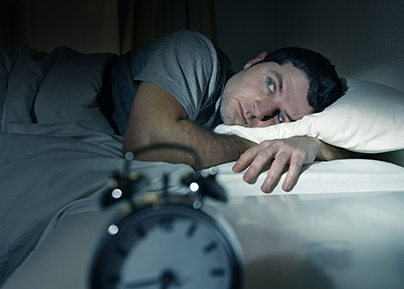Insomnia refers to the difficulty in falling and staying asleep. Poor sleep quality has a large impact on overall quality of health and increases the risk of certain chronic diseases.

A lifestyle of consistent exercise, proper sleep habits, and a Nutritarian eating style can help resolve insomnia.
Insomnia is a common complaint affecting almost 10% of the population.1 It is a symptom that accompanies many chronic diagnoses. It also leads to chronic mood disorders, as well as addictive behaviors, such as alcohol and drug abuse.
The symptoms of insomnia include:
The risk factors/causes of insomnia are multifactorial:
Dr. Fuhrman’s general supplement protocol for adults (see Vitamin Advisor for details) includes:
Multivitamin (without beta-carotene, vitamin A, vitamin E, folic acid, copper), such as Women’s Daily Formula +D3, Men’s Daily Formula +D3, or Gentle Care Formula.
Omega-3 DHA and EPA, such as DHA+EPA Purity.
Optional: Consider adding a mixed mushroom immune supplement, such as Immune Biotect, because of the potential immune system benefits throughout life from assorted mushroom phytochemicals not normally consumed in the diet. Consult your physician if you are on medication.
Additional supplements:
The amino acids L-tryptophan (precursor to serotonin) and L-theanine (found in green tea) and some plant extracts (including lemon balm, valerian, passionflower, and chamomile) have calming properties that may assist with sleep.5-9
For supplement recommendations personalized to you, your health condition and goals, visit the Personalized Vitamin Advisor and answer a few questions.
ONLINE: All members of DrFuhrman.com can search the Ask the Doctor archives for discussions on this topic. Platinum and Diamond members can connect with Dr. Fuhrman by posting questions in the forum. Not a member? Join now.
IN PERSON or ONLINE: Book a consultation with a specialist at Longevity Rx in San Diego, California, run by Joel Fuhrman, MD and Cara Fuhrman, ND. Using nutritional protocols, cutting-edge screening tools, advanced imaging, and innovative treatments for pain and injuries, they'll create a personalized action plan to help you prevent and recover from illness, and achieve your optimal weight. Book online at Longevity Rx or call +1 (858) 367-3558
EVENTS: Join Dr. Fuhrman for an online boot camp, detox or other event. During these immersive online events, you’ll attend zoom lectures, follow a special meal plan, and have access to a special, live Q&A session with Dr. Fuhrman. Learn more about events.
The following are sample questions from the Ask the Doctor Community Platinum and higher members can post their health questions directly to Dr. Fuhrman. (All members can browse questions and answers.)
I am a 38-year-old male with no known health issues, except insomnia. I am mentally tired during the day from not sleeping well at night. I exercise nearly every day and generally am a very happy person. I am 6’3”, 180 pounds. I work in front of a computer all day and also at night when I get home. Could this be keeping me up? What else could it be?
You may have success incorporating this into your routine:
My teenage son has been suffering from insomnia for a couple months now. Living in the college dorms has made it worse. He is having a hard time functioning during the day because he is so tired. Do you have any suggestions?
He should learn how to meditate and truly relax and rest without even trying to sleep.
His diet needs to be better; he should take the typical supplements recommended and maybe try some of the herbal sleep aids, but overall, this is a problem likely exacerbated from stress and fear of not sleeping, and he has to get out of that cycle by learning how to get into a relaxation trance that is almost as good as sleeping. When he can be taught and convinced about totally relaxing his body and mind, he will eventually be able to sleep better again.
Also, morning sunlight, more outdoor activities, and more exercise can help.